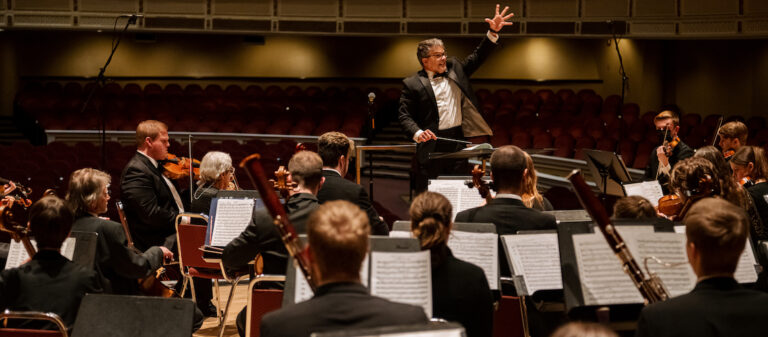Published: October 20, 2025
Within the shiny new Crewe Center for the Arts, students at the Osher School of Music have equally shiny new devices in hand. As part of a new pilot program, the Osher School of Music began exploring the integration of iPads into ensemble rehearsals and performances. This semester, select groups of students are testing the technology with the long-term goal of ensuring that all music majors at USM have access to iPads.
“President Edmondson sees the Apple iPad technology as a resource for greater equity and accessibility across the university, leveling the playing field and preparing students for technological advancements in their future careers,” said Director of the Osher School of Music, Dr. Kyle Nielsen. “She is interested in exploring what that could look like for students at the University of Southern Maine.”
Digital tools are becoming increasingly essential in music education as the field continues to evolve in tandem with technological advancements. Many professional musicians now rely on iPads for efficiency, sustainability, and accessibility.
Story continues below advertisement
In today’s music world, iPads have become essential tools for accessing digital scores, making instant annotations, and turning pages hands-free with Bluetooth pedals. Musicians can store thousands of pieces on one lightweight device, gaining both convenience and accessibility for a wide range of learning needs. They also eliminate the struggle of reading in dimly lit performance spaces, no more stand lights required.
The iPad pilot program began during the Fall 2025 semester with select ensembles: the Osher Chamber Singers and the Osher Wind Ensemble. These groups were chosen because of their diverse musical and logistical needs, allowing the school to test how iPads function across a variety of performance settings.
During rehearsals, students are using the iPads to read and annotate digital scores, access recordings, and streamline communication with conductors and directors. The Spring 2026 semester will focus on classroom environments.
Initial reactions have been positive. Many students and faculty members have expressed excitement about the modernization and accessibility potential. The iPads offer a range of advantages: they are portable, sustainable (significantly reducing paper use), and allow for real-time updates to scores. Students can quickly annotate music, use built-in tools such as tuners and metronomes, and access piano or pitch-matching capabilities; all within a single device.
However, the transition does not come without challenges. Cost remains a major concern, as well as the need for training and technical support. Some students prefer traditional sheet music, and adapting to a digital format can take time. The School of Music plans to provide formal training sessions for both students and faculty, but has not done so yet.
The long-term goal of the initiative is for every music major at USM to have access to an iPad. The School of Music is only interested in considering 13-inch iPad Pros equipped with Apple Pencil Pros and keyboards, ensuring that the devices can serve as comprehensive tools for academic, creative, and professional use.
The Spring 2026 semester plans to integrate iPads into music theory, music history, and other academic settings. As iPads have become standard tools for professional musicians, this initiative aims to prepare students for real-world expectations in their future careers.
Dr. Nielsen noted that the general feeling among students and faculty is one of “relief,” as the devices simplify many aspects of the rehearsal process and reduce logistical stress. To support this shift, the Osher School of Music is encouraging the use of several key applications that enhance musical learning and performance. Among them is forScore, a popular digital sheet music reader that allows users to annotate, organize, and perform from their scores; the app costs approximately $24.99 as a one-time purchase. Tunable, a highly rated tuning, metronome, and drone app designed for precision, costs $4.99. At this stage of the pilot, students are expected to purchase these applications themselves, though the School of Music is exploring future funding options to help offset costs. In time, the program may also expand to include digital textbooks and eBooks, further streamlining access to materials and integrating technology into every facet of the music curriculum.
The initiative extends beyond music. Theatre students at USM are also beginning their own pilot this semester, integrating iPads into costume design coursework to explore how digital tools can enhance creative processes and collaboration. This cross-departmental experimentation marks the beginning of a broader vision within the Crewe Center for the Arts.
The university plans to expand the iPad rollout across not only the Osher School of Music but also the Theatre and Visual Arts programs. This expansion aims to create a unified technological ecosystem within the arts, where students from all disciplines can collaborate, innovate, and prepare for modern professional expectations in their respective fields.
This pilot project represents a significant step toward blending tradition and innovation at the Osher School of Music. By combining musical artistry with modern technology, the school is shaping a more accessible, efficient, and forward-thinking learning environment. If successful, the program could transform how students at USM learn, rehearse, and perform, and begin setting a new standard for arts education in the digital age.
Images are for reference only.Images and contents gathered automatic from google or 3rd party sources.All rights on the images and contents are with their legal original owners.
